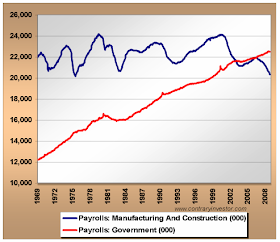According to some analysts, the risk of a Zimbabwe like hyperinflation to happen to the US dollar is slim if not implausible. Because the idea is, once 'inflation' gains a footing and eventually overcomes 'deflation' it will be easier to control.
Perhaps. But such is giving too much credit to the ability of authorities to steer us out of trouble.
But before acceding to such premises, it is best that we must try to understand Zimbabwe’s hyperinflation model.
We quoted Albert Makochekanwa of the Department of Economics of the University of Pretoria, South Africa in our Will Debt Deflation Lead To A Deflationary Environment?, who wrote in his paper “Zimbabwe’s Hyperinflation Money Demand Model” the following: ``Borrowing from Keynes (1920) suggestions, namely that ‘even the weakest government can enforce inflation when it can enforce nothing else’; evidence indicates that Zimbabwean government has been good at using the money machine print. Coorey et al (2007:8) point out that ‘Accelerating inflation in Zimbabwe has been fueled by high rates of money growth reflecting rising fiscal and quasi-fiscal deficits’. As a result of that, the very high inflationary trend that the country has been experiencing in the recent years is a direct result of, among other factors, massive money printing to finance government expenditures and government deficits.”
So, exploding DEFICITS…
 From caseyresearch
From caseyresearchPlus a jump in government payrolls which has surpassed the private sector, which further entrenches government spending...
Plus, a soaring growth money supply, which according to Jeff Tucker of Mises.org seems starting to respond… And importantly a snowballing clamor for the printing press:
And importantly a snowballing clamor for the printing press:
Previously we posted Ken Rogoff see Kenneth Rogoff: Inflate Our Debts Away!
And now:
From Peter Boone and Simon Johnson (Wall Street Journal Blog)…
``The Fed should announce that it will create inflation in 2009, i.e., it will do whatever it takes to make sure that wages and prices rise, rather than fall, in the next 12 months. And it should back that up with more aggressive monetary expansion, buying even more government and private securities. We cannot wait for a deflationary death spiral to take hold
From the Economic Times…
``There is not much government can do to accelerate the real rate of growth. The remaining option is to tolerate, even encourage, a faster rate of inflation to improve debt-service capacity. Even more than debt nationalization, inflation is the ultimate way to spread the costs of debt workout across the widest possible section of the population.
And at ZERO interest rates, ``we are entering a world with interest rates that are far too high for the economy's good," Goldman Chief U.S. Economist Jan Hatzius wrote in a Jan. 16 research note.” (Businessweek)
``The solution is obvious: The Fed needs to deliberately raise the rate of inflation—maybe not all the way to 6%, but significantly above zero. One way to do that is to print lots of money. The Fed can create money from thin air by purchasing assets such as Treasuries and mortgage-backed securities and paying for them by crediting the seller with newly created reserves at the central bank.” writes Peter Coy of Businessweek
Essentially Dr. Gideon Gono of Zimbabwe seems to be gaining quite a following among personalities in Wall Street, the academe and in the media... Aside from of course, public authorities like Mervyn King Governor of the Bank of England who will likewise do a Gono.
Aside from of course, public authorities like Mervyn King Governor of the Bank of England who will likewise do a Gono.
As for the risk of hyperinflation in the US or elsewhere, I’d rather be guided by Ludwig Von Mises in Human Action p. 427….
``But then finally the masses wake up. They become suddenly aware of the fact that inflation is a deliberate policy and will go on endlessly. A breakdown occurs. The crack-up boom appears. Everybody is anxious to swap his money against "real" goods, no matter whether he needs them or not, no matter how much money he has to pay for them. Within a very short time, within a few weeks or even days, the things which were used as money are no longer used as media of exchange. They become scrap paper. Nobody wants to give away anything against them.”
``It was this that happened with the Continental currency in America in 1781, with the French mandats territoriaux in 1796, and with the German mark in 1923. It will happen again whenever the same conditions appear. If a thing has to be used as a medium of exchange, public opinion must not believe that the quantity of this thing will increase beyond all bounds. Inflation is a policy that cannot last.”

No comments:
Post a Comment